Strategic Analysis of the Hospitality and Tourism Market: Hilton Hotel
VerifiedAdded on 2021/01/02
|8
|1778
|68
Report
AI Summary
This report provides a detailed analysis of the Hilton Hotel within the hospitality and tourism market. It begins with an introduction to the sector, emphasizing the interconnectedness of hospitality and tourism. The report then focuses on Hilton Hotel, established in 1919, highlighting its global presence across six continents and its position as one of the oldest hotel brands. The analysis includes the application of SPT strategies and the Four P's of marketing (Product, Price, Place, and Promotion). It also covers brand awareness initiatives and current marketing materials. A comprehensive SWOT analysis identifies the hotel's strengths, weaknesses, opportunities, and threats. Furthermore, a PESTEL analysis examines the political, economic, social, technological, environmental, and legal factors influencing the hotel's operations. The report identifies major challenges faced by Hilton Hotel and discusses business management practices in the travel and tourism sector. Finally, it offers recommendations for future strategies, including leveraging technology and building strong relationships with vendors, concluding that Hilton Hotels offers a wide array of services to attract a large customer base.
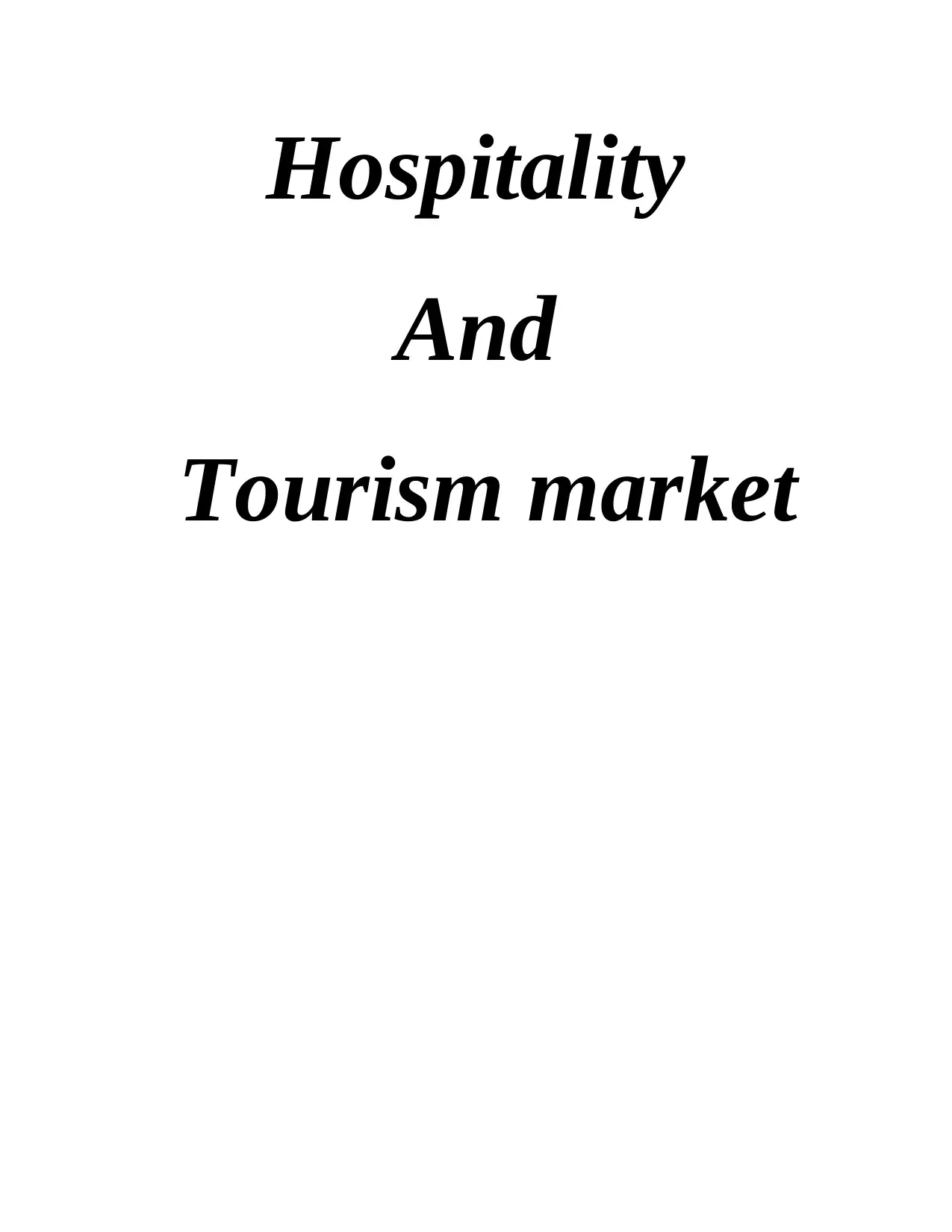
Hospitality
And
Tourism market
And
Tourism market
Paraphrase This Document
Need a fresh take? Get an instant paraphrase of this document with our AI Paraphraser
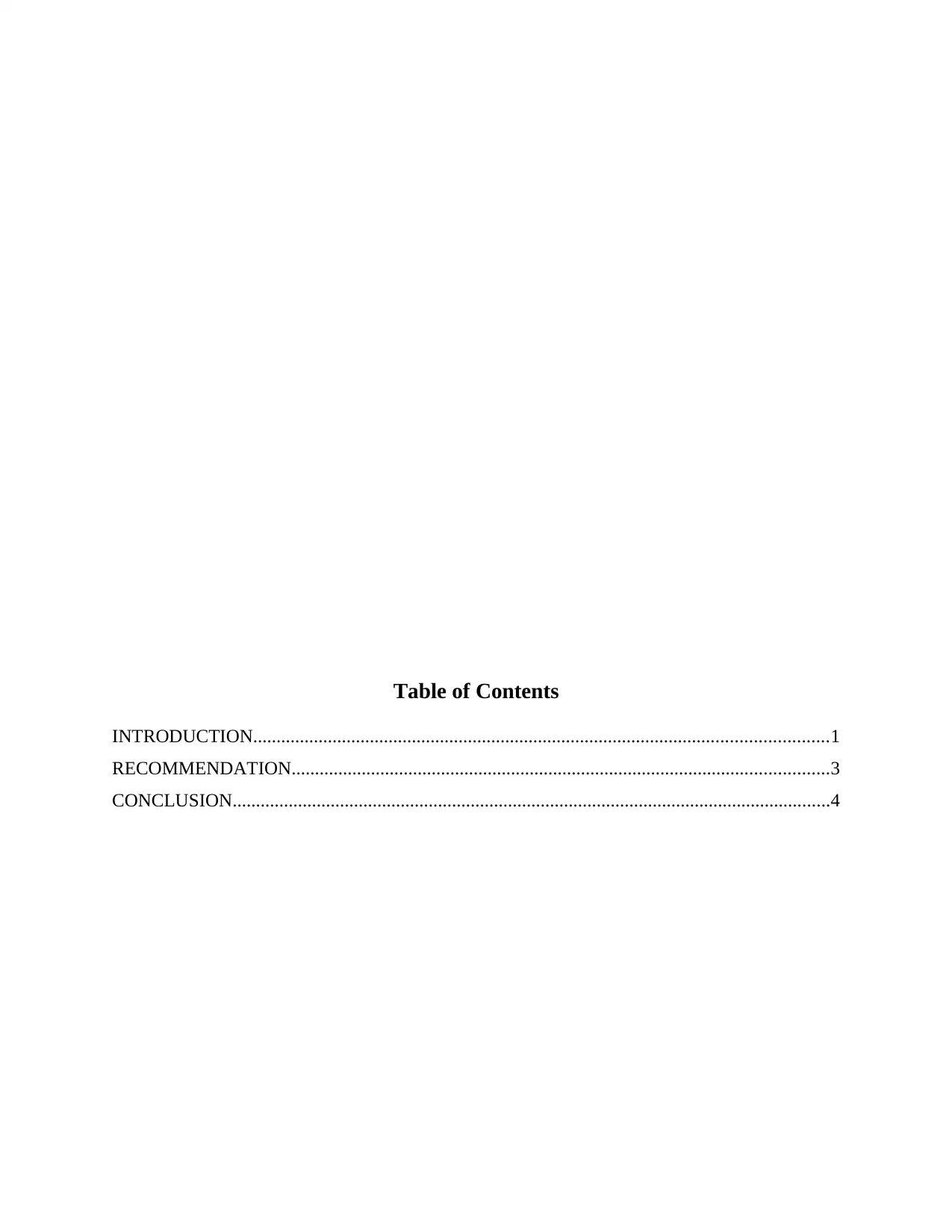
Table of Contents
INTRODUCTION...........................................................................................................................1
RECOMMENDATION...................................................................................................................3
CONCLUSION................................................................................................................................4
INTRODUCTION...........................................................................................................................1
RECOMMENDATION...................................................................................................................3
CONCLUSION................................................................................................................................4
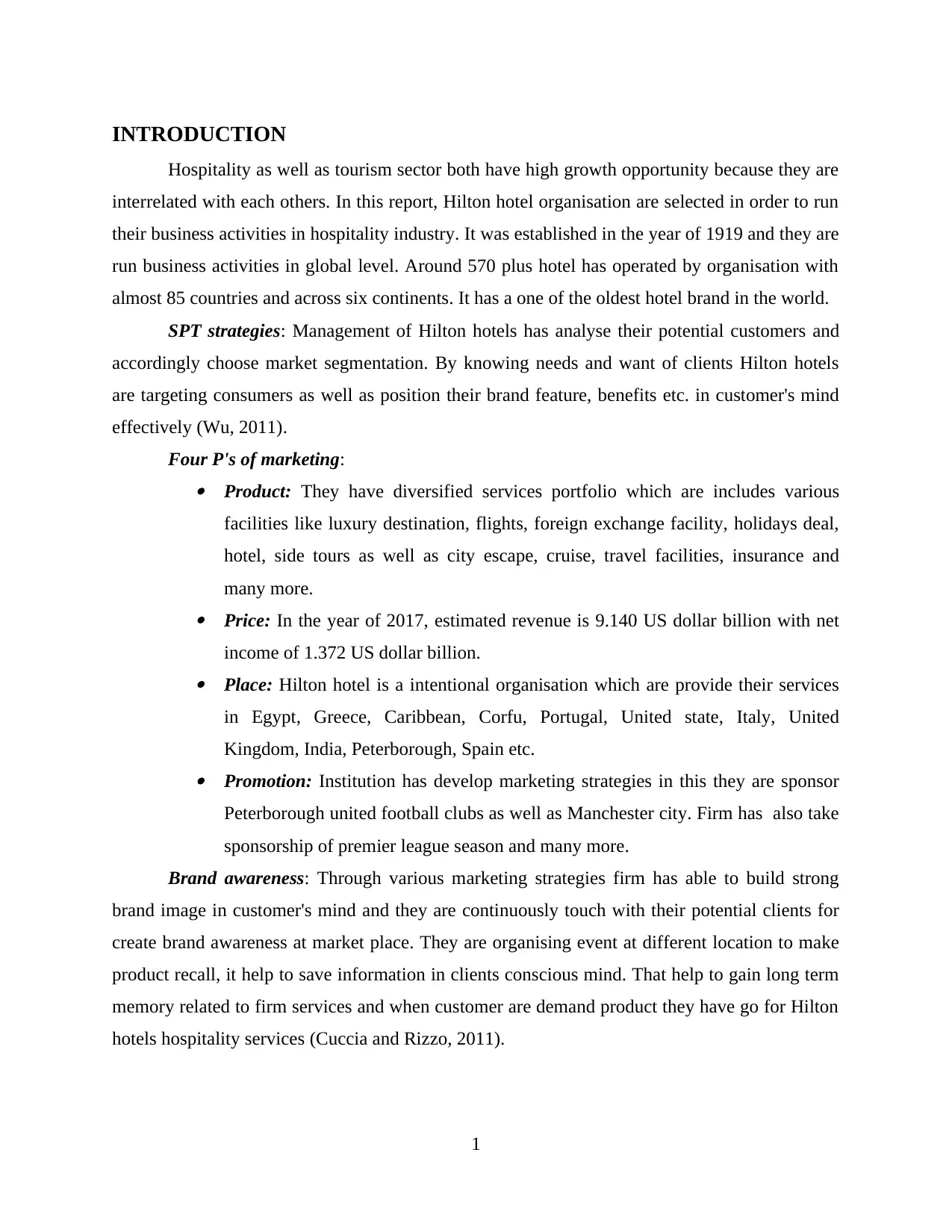
INTRODUCTION
Hospitality as well as tourism sector both have high growth opportunity because they are
interrelated with each others. In this report, Hilton hotel organisation are selected in order to run
their business activities in hospitality industry. It was established in the year of 1919 and they are
run business activities in global level. Around 570 plus hotel has operated by organisation with
almost 85 countries and across six continents. It has a one of the oldest hotel brand in the world.
SPT strategies: Management of Hilton hotels has analyse their potential customers and
accordingly choose market segmentation. By knowing needs and want of clients Hilton hotels
are targeting consumers as well as position their brand feature, benefits etc. in customer's mind
effectively (Wu, 2011).
Four P's of marketing:
Product: They have diversified services portfolio which are includes various
facilities like luxury destination, flights, foreign exchange facility, holidays deal,
hotel, side tours as well as city escape, cruise, travel facilities, insurance and
many more.
Price: In the year of 2017, estimated revenue is 9.140 US dollar billion with net
income of 1.372 US dollar billion.
Place: Hilton hotel is a intentional organisation which are provide their services
in Egypt, Greece, Caribbean, Corfu, Portugal, United state, Italy, United
Kingdom, India, Peterborough, Spain etc.
Promotion: Institution has develop marketing strategies in this they are sponsor
Peterborough united football clubs as well as Manchester city. Firm has also take
sponsorship of premier league season and many more.
Brand awareness: Through various marketing strategies firm has able to build strong
brand image in customer's mind and they are continuously touch with their potential clients for
create brand awareness at market place. They are organising event at different location to make
product recall, it help to save information in clients conscious mind. That help to gain long term
memory related to firm services and when customer are demand product they have go for Hilton
hotels hospitality services (Cuccia and Rizzo, 2011).
1
Hospitality as well as tourism sector both have high growth opportunity because they are
interrelated with each others. In this report, Hilton hotel organisation are selected in order to run
their business activities in hospitality industry. It was established in the year of 1919 and they are
run business activities in global level. Around 570 plus hotel has operated by organisation with
almost 85 countries and across six continents. It has a one of the oldest hotel brand in the world.
SPT strategies: Management of Hilton hotels has analyse their potential customers and
accordingly choose market segmentation. By knowing needs and want of clients Hilton hotels
are targeting consumers as well as position their brand feature, benefits etc. in customer's mind
effectively (Wu, 2011).
Four P's of marketing:
Product: They have diversified services portfolio which are includes various
facilities like luxury destination, flights, foreign exchange facility, holidays deal,
hotel, side tours as well as city escape, cruise, travel facilities, insurance and
many more.
Price: In the year of 2017, estimated revenue is 9.140 US dollar billion with net
income of 1.372 US dollar billion.
Place: Hilton hotel is a intentional organisation which are provide their services
in Egypt, Greece, Caribbean, Corfu, Portugal, United state, Italy, United
Kingdom, India, Peterborough, Spain etc.
Promotion: Institution has develop marketing strategies in this they are sponsor
Peterborough united football clubs as well as Manchester city. Firm has also take
sponsorship of premier league season and many more.
Brand awareness: Through various marketing strategies firm has able to build strong
brand image in customer's mind and they are continuously touch with their potential clients for
create brand awareness at market place. They are organising event at different location to make
product recall, it help to save information in clients conscious mind. That help to gain long term
memory related to firm services and when customer are demand product they have go for Hilton
hotels hospitality services (Cuccia and Rizzo, 2011).
1
⊘ This is a preview!⊘
Do you want full access?
Subscribe today to unlock all pages.

Trusted by 1+ million students worldwide
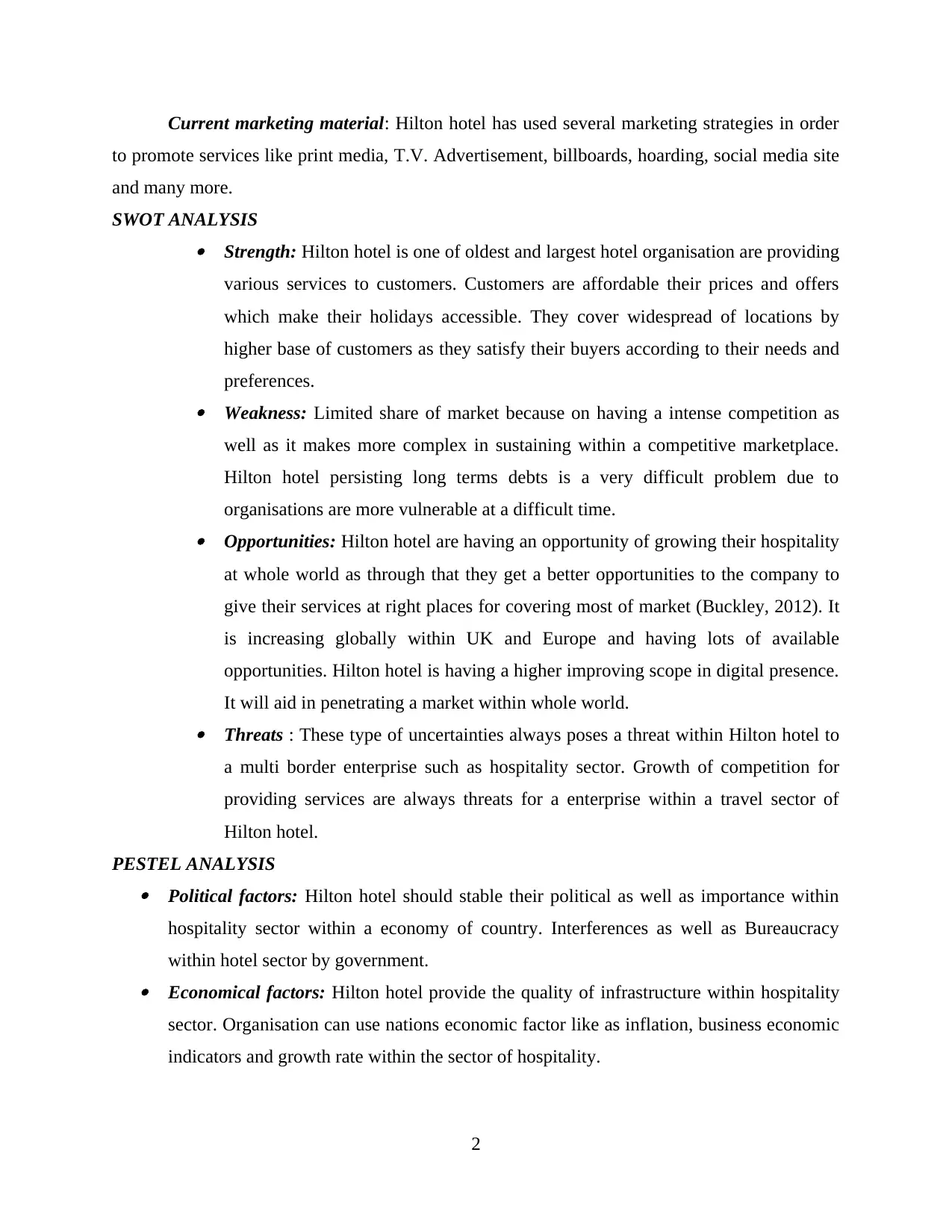
Current marketing material: Hilton hotel has used several marketing strategies in order
to promote services like print media, T.V. Advertisement, billboards, hoarding, social media site
and many more.
SWOT ANALYSIS
Strength: Hilton hotel is one of oldest and largest hotel organisation are providing
various services to customers. Customers are affordable their prices and offers
which make their holidays accessible. They cover widespread of locations by
higher base of customers as they satisfy their buyers according to their needs and
preferences.
Weakness: Limited share of market because on having a intense competition as
well as it makes more complex in sustaining within a competitive marketplace.
Hilton hotel persisting long terms debts is a very difficult problem due to
organisations are more vulnerable at a difficult time.
Opportunities: Hilton hotel are having an opportunity of growing their hospitality
at whole world as through that they get a better opportunities to the company to
give their services at right places for covering most of market (Buckley, 2012). It
is increasing globally within UK and Europe and having lots of available
opportunities. Hilton hotel is having a higher improving scope in digital presence.
It will aid in penetrating a market within whole world.
Threats : These type of uncertainties always poses a threat within Hilton hotel to
a multi border enterprise such as hospitality sector. Growth of competition for
providing services are always threats for a enterprise within a travel sector of
Hilton hotel.
PESTEL ANALYSIS Political factors: Hilton hotel should stable their political as well as importance within
hospitality sector within a economy of country. Interferences as well as Bureaucracy
within hotel sector by government. Economical factors: Hilton hotel provide the quality of infrastructure within hospitality
sector. Organisation can use nations economic factor like as inflation, business economic
indicators and growth rate within the sector of hospitality.
2
to promote services like print media, T.V. Advertisement, billboards, hoarding, social media site
and many more.
SWOT ANALYSIS
Strength: Hilton hotel is one of oldest and largest hotel organisation are providing
various services to customers. Customers are affordable their prices and offers
which make their holidays accessible. They cover widespread of locations by
higher base of customers as they satisfy their buyers according to their needs and
preferences.
Weakness: Limited share of market because on having a intense competition as
well as it makes more complex in sustaining within a competitive marketplace.
Hilton hotel persisting long terms debts is a very difficult problem due to
organisations are more vulnerable at a difficult time.
Opportunities: Hilton hotel are having an opportunity of growing their hospitality
at whole world as through that they get a better opportunities to the company to
give their services at right places for covering most of market (Buckley, 2012). It
is increasing globally within UK and Europe and having lots of available
opportunities. Hilton hotel is having a higher improving scope in digital presence.
It will aid in penetrating a market within whole world.
Threats : These type of uncertainties always poses a threat within Hilton hotel to
a multi border enterprise such as hospitality sector. Growth of competition for
providing services are always threats for a enterprise within a travel sector of
Hilton hotel.
PESTEL ANALYSIS Political factors: Hilton hotel should stable their political as well as importance within
hospitality sector within a economy of country. Interferences as well as Bureaucracy
within hotel sector by government. Economical factors: Hilton hotel provide the quality of infrastructure within hospitality
sector. Organisation can use nations economic factor like as inflation, business economic
indicators and growth rate within the sector of hospitality.
2
Paraphrase This Document
Need a fresh take? Get an instant paraphrase of this document with our AI Paraphraser
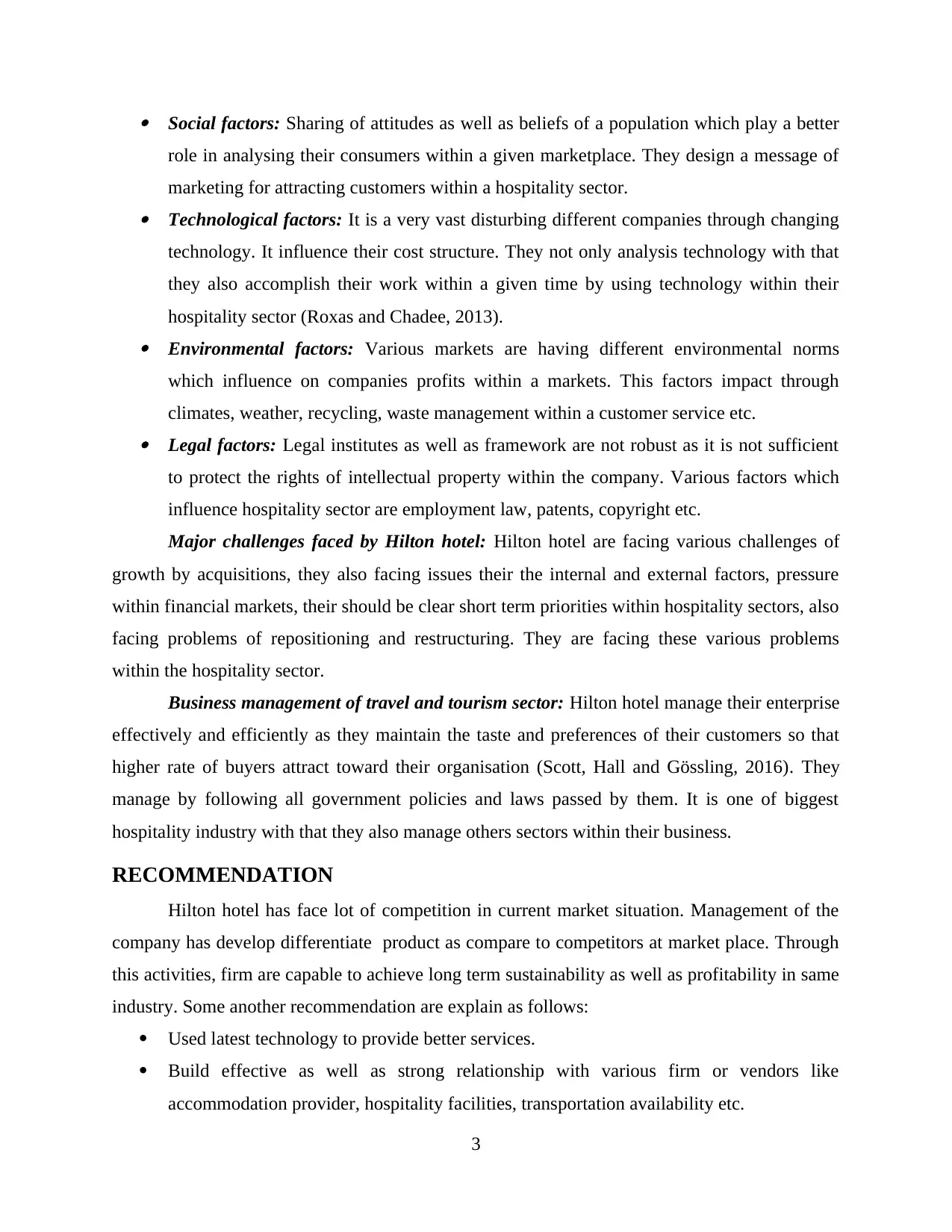
Social factors: Sharing of attitudes as well as beliefs of a population which play a better
role in analysing their consumers within a given marketplace. They design a message of
marketing for attracting customers within a hospitality sector. Technological factors: It is a very vast disturbing different companies through changing
technology. It influence their cost structure. They not only analysis technology with that
they also accomplish their work within a given time by using technology within their
hospitality sector (Roxas and Chadee, 2013). Environmental factors: Various markets are having different environmental norms
which influence on companies profits within a markets. This factors impact through
climates, weather, recycling, waste management within a customer service etc. Legal factors: Legal institutes as well as framework are not robust as it is not sufficient
to protect the rights of intellectual property within the company. Various factors which
influence hospitality sector are employment law, patents, copyright etc.
Major challenges faced by Hilton hotel: Hilton hotel are facing various challenges of
growth by acquisitions, they also facing issues their the internal and external factors, pressure
within financial markets, their should be clear short term priorities within hospitality sectors, also
facing problems of repositioning and restructuring. They are facing these various problems
within the hospitality sector.
Business management of travel and tourism sector: Hilton hotel manage their enterprise
effectively and efficiently as they maintain the taste and preferences of their customers so that
higher rate of buyers attract toward their organisation (Scott, Hall and Gössling, 2016). They
manage by following all government policies and laws passed by them. It is one of biggest
hospitality industry with that they also manage others sectors within their business.
RECOMMENDATION
Hilton hotel has face lot of competition in current market situation. Management of the
company has develop differentiate product as compare to competitors at market place. Through
this activities, firm are capable to achieve long term sustainability as well as profitability in same
industry. Some another recommendation are explain as follows:
Used latest technology to provide better services.
Build effective as well as strong relationship with various firm or vendors like
accommodation provider, hospitality facilities, transportation availability etc.
3
role in analysing their consumers within a given marketplace. They design a message of
marketing for attracting customers within a hospitality sector. Technological factors: It is a very vast disturbing different companies through changing
technology. It influence their cost structure. They not only analysis technology with that
they also accomplish their work within a given time by using technology within their
hospitality sector (Roxas and Chadee, 2013). Environmental factors: Various markets are having different environmental norms
which influence on companies profits within a markets. This factors impact through
climates, weather, recycling, waste management within a customer service etc. Legal factors: Legal institutes as well as framework are not robust as it is not sufficient
to protect the rights of intellectual property within the company. Various factors which
influence hospitality sector are employment law, patents, copyright etc.
Major challenges faced by Hilton hotel: Hilton hotel are facing various challenges of
growth by acquisitions, they also facing issues their the internal and external factors, pressure
within financial markets, their should be clear short term priorities within hospitality sectors, also
facing problems of repositioning and restructuring. They are facing these various problems
within the hospitality sector.
Business management of travel and tourism sector: Hilton hotel manage their enterprise
effectively and efficiently as they maintain the taste and preferences of their customers so that
higher rate of buyers attract toward their organisation (Scott, Hall and Gössling, 2016). They
manage by following all government policies and laws passed by them. It is one of biggest
hospitality industry with that they also manage others sectors within their business.
RECOMMENDATION
Hilton hotel has face lot of competition in current market situation. Management of the
company has develop differentiate product as compare to competitors at market place. Through
this activities, firm are capable to achieve long term sustainability as well as profitability in same
industry. Some another recommendation are explain as follows:
Used latest technology to provide better services.
Build effective as well as strong relationship with various firm or vendors like
accommodation provider, hospitality facilities, transportation availability etc.
3
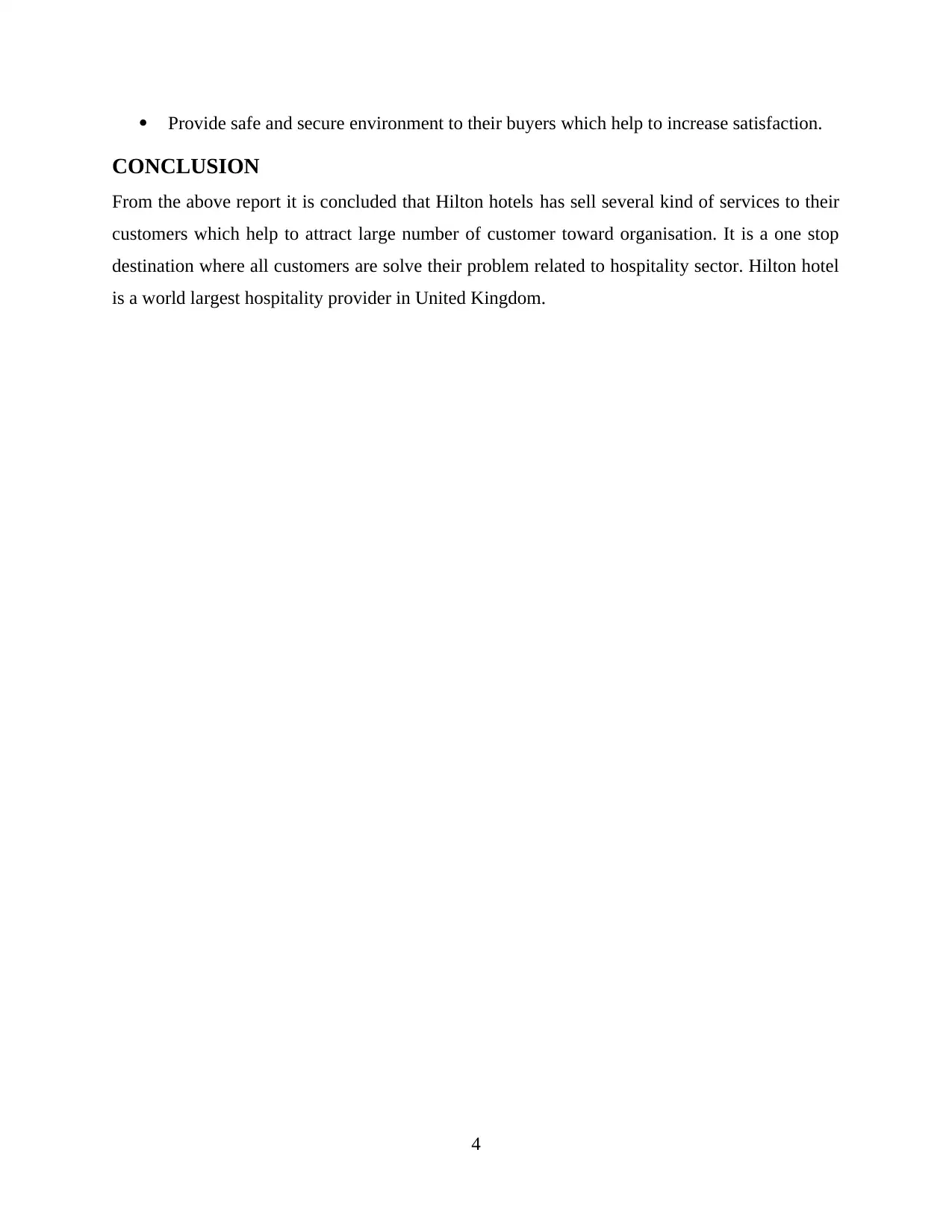
Provide safe and secure environment to their buyers which help to increase satisfaction.
CONCLUSION
From the above report it is concluded that Hilton hotels has sell several kind of services to their
customers which help to attract large number of customer toward organisation. It is a one stop
destination where all customers are solve their problem related to hospitality sector. Hilton hotel
is a world largest hospitality provider in United Kingdom.
4
CONCLUSION
From the above report it is concluded that Hilton hotels has sell several kind of services to their
customers which help to attract large number of customer toward organisation. It is a one stop
destination where all customers are solve their problem related to hospitality sector. Hilton hotel
is a world largest hospitality provider in United Kingdom.
4
⊘ This is a preview!⊘
Do you want full access?
Subscribe today to unlock all pages.

Trusted by 1+ million students worldwide
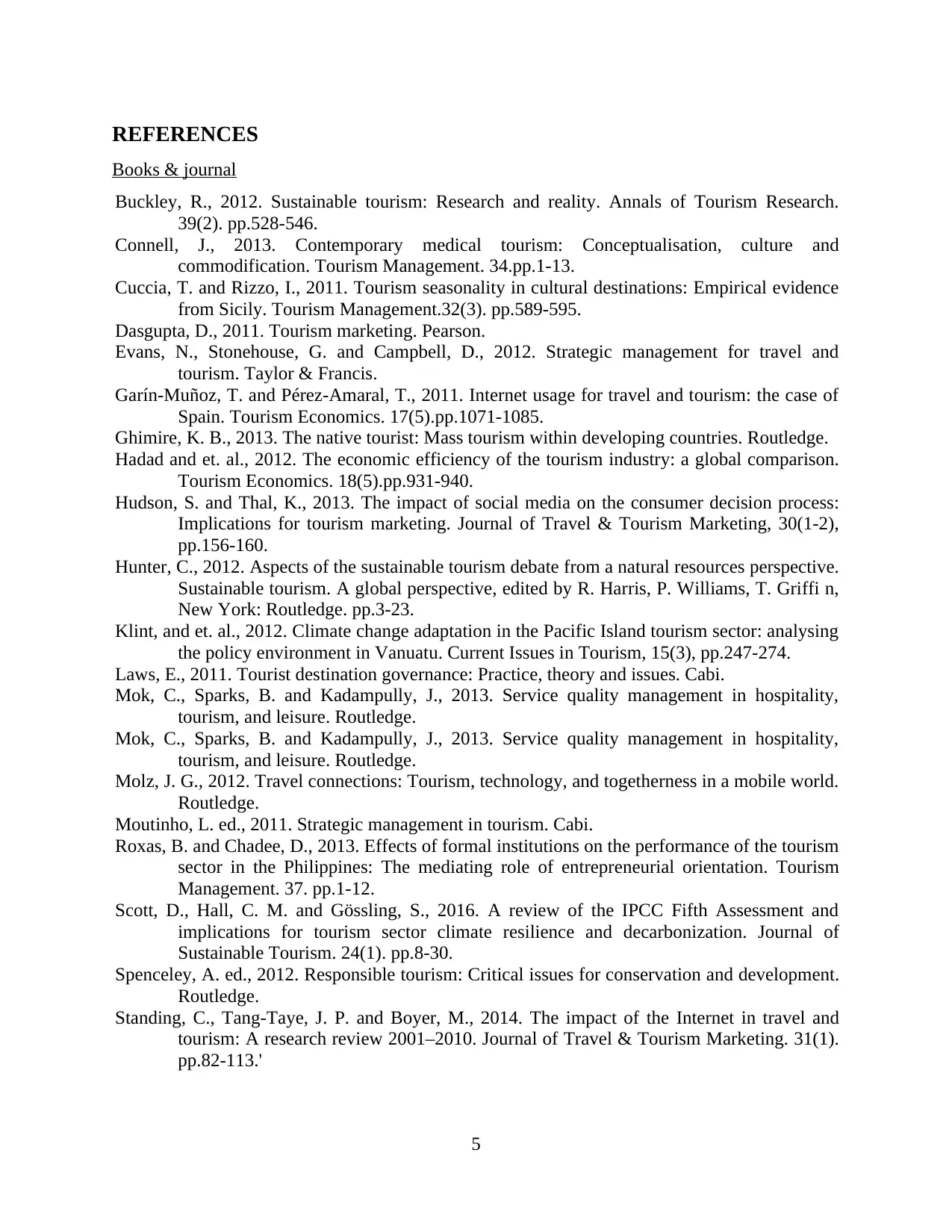
REFERENCES
Books & journal
Buckley, R., 2012. Sustainable tourism: Research and reality. Annals of Tourism Research.
39(2). pp.528-546.
Connell, J., 2013. Contemporary medical tourism: Conceptualisation, culture and
commodification. Tourism Management. 34.pp.1-13.
Cuccia, T. and Rizzo, I., 2011. Tourism seasonality in cultural destinations: Empirical evidence
from Sicily. Tourism Management.32(3). pp.589-595.
Dasgupta, D., 2011. Tourism marketing. Pearson.
Evans, N., Stonehouse, G. and Campbell, D., 2012. Strategic management for travel and
tourism. Taylor & Francis.
Garín-Muñoz, T. and Pérez-Amaral, T., 2011. Internet usage for travel and tourism: the case of
Spain. Tourism Economics. 17(5).pp.1071-1085.
Ghimire, K. B., 2013. The native tourist: Mass tourism within developing countries. Routledge.
Hadad and et. al., 2012. The economic efficiency of the tourism industry: a global comparison.
Tourism Economics. 18(5).pp.931-940.
Hudson, S. and Thal, K., 2013. The impact of social media on the consumer decision process:
Implications for tourism marketing. Journal of Travel & Tourism Marketing, 30(1-2),
pp.156-160.
Hunter, C., 2012. Aspects of the sustainable tourism debate from a natural resources perspective.
Sustainable tourism. A global perspective, edited by R. Harris, P. Williams, T. Griffi n,
New York: Routledge. pp.3-23.
Klint, and et. al., 2012. Climate change adaptation in the Pacific Island tourism sector: analysing
the policy environment in Vanuatu. Current Issues in Tourism, 15(3), pp.247-274.
Laws, E., 2011. Tourist destination governance: Practice, theory and issues. Cabi.
Mok, C., Sparks, B. and Kadampully, J., 2013. Service quality management in hospitality,
tourism, and leisure. Routledge.
Mok, C., Sparks, B. and Kadampully, J., 2013. Service quality management in hospitality,
tourism, and leisure. Routledge.
Molz, J. G., 2012. Travel connections: Tourism, technology, and togetherness in a mobile world.
Routledge.
Moutinho, L. ed., 2011. Strategic management in tourism. Cabi.
Roxas, B. and Chadee, D., 2013. Effects of formal institutions on the performance of the tourism
sector in the Philippines: The mediating role of entrepreneurial orientation. Tourism
Management. 37. pp.1-12.
Scott, D., Hall, C. M. and Gössling, S., 2016. A review of the IPCC Fifth Assessment and
implications for tourism sector climate resilience and decarbonization. Journal of
Sustainable Tourism. 24(1). pp.8-30.
Spenceley, A. ed., 2012. Responsible tourism: Critical issues for conservation and development.
Routledge.
Standing, C., Tang-Taye, J. P. and Boyer, M., 2014. The impact of the Internet in travel and
tourism: A research review 2001–2010. Journal of Travel & Tourism Marketing. 31(1).
pp.82-113.'
5
Books & journal
Buckley, R., 2012. Sustainable tourism: Research and reality. Annals of Tourism Research.
39(2). pp.528-546.
Connell, J., 2013. Contemporary medical tourism: Conceptualisation, culture and
commodification. Tourism Management. 34.pp.1-13.
Cuccia, T. and Rizzo, I., 2011. Tourism seasonality in cultural destinations: Empirical evidence
from Sicily. Tourism Management.32(3). pp.589-595.
Dasgupta, D., 2011. Tourism marketing. Pearson.
Evans, N., Stonehouse, G. and Campbell, D., 2012. Strategic management for travel and
tourism. Taylor & Francis.
Garín-Muñoz, T. and Pérez-Amaral, T., 2011. Internet usage for travel and tourism: the case of
Spain. Tourism Economics. 17(5).pp.1071-1085.
Ghimire, K. B., 2013. The native tourist: Mass tourism within developing countries. Routledge.
Hadad and et. al., 2012. The economic efficiency of the tourism industry: a global comparison.
Tourism Economics. 18(5).pp.931-940.
Hudson, S. and Thal, K., 2013. The impact of social media on the consumer decision process:
Implications for tourism marketing. Journal of Travel & Tourism Marketing, 30(1-2),
pp.156-160.
Hunter, C., 2012. Aspects of the sustainable tourism debate from a natural resources perspective.
Sustainable tourism. A global perspective, edited by R. Harris, P. Williams, T. Griffi n,
New York: Routledge. pp.3-23.
Klint, and et. al., 2012. Climate change adaptation in the Pacific Island tourism sector: analysing
the policy environment in Vanuatu. Current Issues in Tourism, 15(3), pp.247-274.
Laws, E., 2011. Tourist destination governance: Practice, theory and issues. Cabi.
Mok, C., Sparks, B. and Kadampully, J., 2013. Service quality management in hospitality,
tourism, and leisure. Routledge.
Mok, C., Sparks, B. and Kadampully, J., 2013. Service quality management in hospitality,
tourism, and leisure. Routledge.
Molz, J. G., 2012. Travel connections: Tourism, technology, and togetherness in a mobile world.
Routledge.
Moutinho, L. ed., 2011. Strategic management in tourism. Cabi.
Roxas, B. and Chadee, D., 2013. Effects of formal institutions on the performance of the tourism
sector in the Philippines: The mediating role of entrepreneurial orientation. Tourism
Management. 37. pp.1-12.
Scott, D., Hall, C. M. and Gössling, S., 2016. A review of the IPCC Fifth Assessment and
implications for tourism sector climate resilience and decarbonization. Journal of
Sustainable Tourism. 24(1). pp.8-30.
Spenceley, A. ed., 2012. Responsible tourism: Critical issues for conservation and development.
Routledge.
Standing, C., Tang-Taye, J. P. and Boyer, M., 2014. The impact of the Internet in travel and
tourism: A research review 2001–2010. Journal of Travel & Tourism Marketing. 31(1).
pp.82-113.'
5
Paraphrase This Document
Need a fresh take? Get an instant paraphrase of this document with our AI Paraphraser

6
1 out of 8
Related Documents
Your All-in-One AI-Powered Toolkit for Academic Success.
+13062052269
info@desklib.com
Available 24*7 on WhatsApp / Email
![[object Object]](/_next/static/media/star-bottom.7253800d.svg)
Unlock your academic potential
Copyright © 2020–2026 A2Z Services. All Rights Reserved. Developed and managed by ZUCOL.





